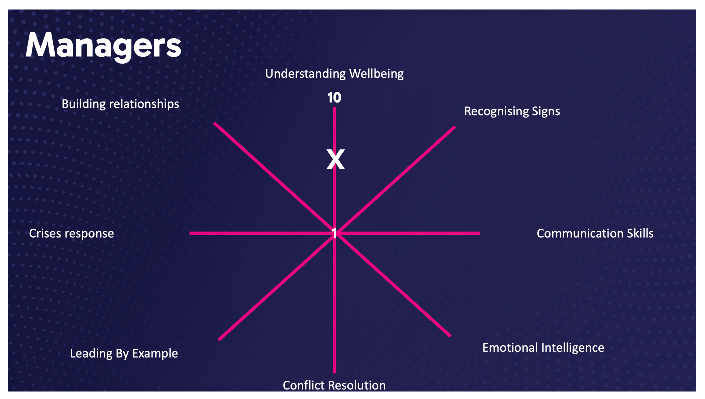
24 April 2024
Supportive environments are created by effective managers
Following on from last week’s webinar with Smart Clinic. Let’s delve into the pivotal role managers and leaders play in fostering a culture of support within their teams by creating supportive environments.
The Power of Supportive Management
Imagine a workplace where managers aren’t just leaders but beacons of support and encouragement. In such an environment, employee wellbeing isn’t a mere checkbox, it’s the heartbeat of the organisation. Supportive managers prioritise the happiness and fulfilment of their team members, nurturing trust, open communication, and psychological safety. This creates a community where every voice matters, every idea counts, and every individual feels valued, motivated, and empowered to give their all.
Let’s focus on the essential responsibilities of managers in creating supportive environments:
- Emotional Support: Effective managers uplift their team members, creating a safe space where employees can express themselves freely, knowing they’ll be met with empathy and understanding.
- Communication and Collaboration: Supportive managers break down barriers and build bridges of communication that encourage the flow of ideas and the tackling of challenges as a team.
- Conflict Resolution: Skilled managers navigate conflicts with finesse and diplomacy, ensuring every voice is heard and every issue is resolved with fairness and respect.
- Recognition and Feedback: Supportive managers offer praise and constructive criticism, nurturing a culture of continuous improvement.
Empowering Managers for Success
Investing in manager wellbeing training is crucial. Equipping managers with the skills and resources they need to support employee wellbeing lays the groundwork for success, satisfaction, and endless possibilities.
Auditing managers skills in creating a supportive workplace environment
Grad yourself a pen and a piece of paper. Reflect on your current managerial practices. How well do they create supportive environments? Where are your strengths? Where are your opportunities for growth? What steps can you take today to enhance support for your team’s wellbeing? Let’s explore eight key strands that illuminate the role of managers in fostering a supportive environment within their teams:
- Understanding Wellbeing
- Recognising Signs
- Communication Skills
- Emotional Intelligence
- Conflict Resolution
- Leading By Example
- Crisis Response
- Building Relationships
Start by drawing the following diagram. You are going to plot your current standing on each of the 8 strands by using a 1 – 10 scale 1 (low), 10 (high).

- Understanding Wellbeing
How well do your managers grasp the concept of wellbeing and its significance within your organisation? Are they equipped to define it, understand its nuances, and champion its importance? Assess their knowledge to establish a foundation for a wellbeing-driven culture. - Recognising Signs
Can your managers spot subtle signs of wellbeing concerns in their team members? Evaluate their ability to identify common signs indicating employee wellbeing issues, differentiate between temporary fluctuations and serious concerns, and offer timely support when needed. - Communication Skills
How effectively do your managers navigate wellbeing conversations? Assess their ability to apply active listening principles, create a safe space for open communication, encourage feedback, and validate team members’ perspectives. Rate their skill in fostering trust and rapport within the team through effective communication. - Emotional Intelligence
Evaluate your managers’ emotional intelligence. Do they actively listen to employees’ concerns and empathise with their perspectives? Assess their ability to regulate emotions, respond to feedback or criticism, and demonstrate self-awareness regarding their own strengths, weaknesses, and emotional triggers. - Conflict Resolution
Assess your managers’ adeptness in navigating conflicts and finding common ground. Evaluate their effectiveness in conflict resolution techniques, facilitating constructive conversations, restoring harmony within teams, and addressing issues promptly to prevent escalation. - Leading By Example
How well do your managers lead by example in prioritising wellbeing? Evaluate their communication about the importance of wellbeing, promotion of work-life balance, support for stress management, and role modelling of effective wellbeing behaviours and skills. - Crisis Response
Assess your managers’ preparedness to navigate crises and offer unwavering support to their team members. Evaluate their handling of change or uncertainty, responsiveness to crises impacting employee wellbeing, and ability to lead with resilience, compassion, and agility in adversity. - Building Relationships
Evaluate your managers’ effectiveness in cultivating strong, supportive relationships with team members. Assess their ability to build trust, foster a positive work environment encouraging open communication and collaboration, and support and motivate team members considering their individual emotions and needs.
After assessing these areas, reflect on your strengths and opportunities for growth. Consider what you would like your diagram to look like as you strive to build a workplace culture prioritising employee wellbeing and driving organisational success.
By auditing and reviewing the role of your managers and combining this with intentional actions, you can unleash the potential of effective leadership in cultivating a workplace culture that prioritises employee wellbeing and drives organisational success.

- Managerial Support – Effective managers serve as pillars of support, fostering trust, open communication, and psychological safety within their teams. They create supportive environments.
- Essential Responsibilities – Supportive managers prioritise emotional support, effective communication, conflict resolution, and recognition of their team members’ contributions.
- Empowerment Through Training – Investing in manager wellbeing training equips them with the necessary skills to support employee wellbeing and drive organisational success.
- Actionable Steps – Reflect on current managerial practices, identify strengths and areas for growth, and take intentional steps to enhance support for team wellbeing.
- Key Strands of Managerial Role – Understanding wellbeing, recognising signs, communication skills, emotional intelligence, conflict resolution, leading by example, crisis response, and building relationships are vital aspects of managerial effectiveness in fostering a supportive workplace environment.
Our next Strategic Wellbeing Webinar in association with Smart Clinic is on Wednesday 29th May 12pm-12:30pm, don’t miss out register here now! Register
If you are interested in learning more about Smart Clinic, please click here
Sign up to our newsletter to gain access to regular People First updates.




